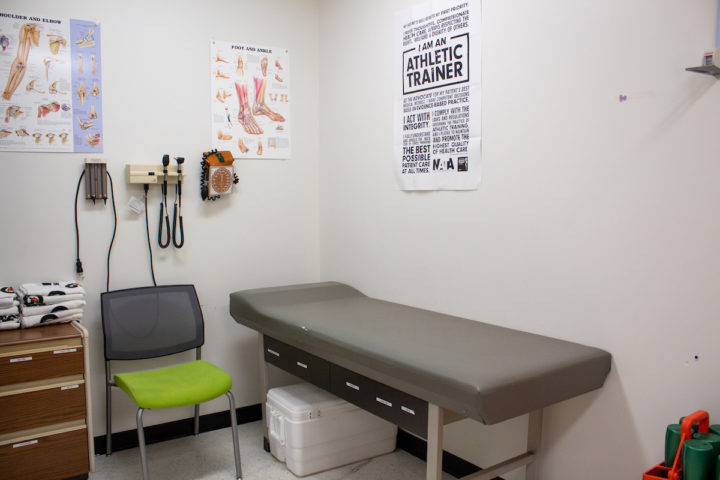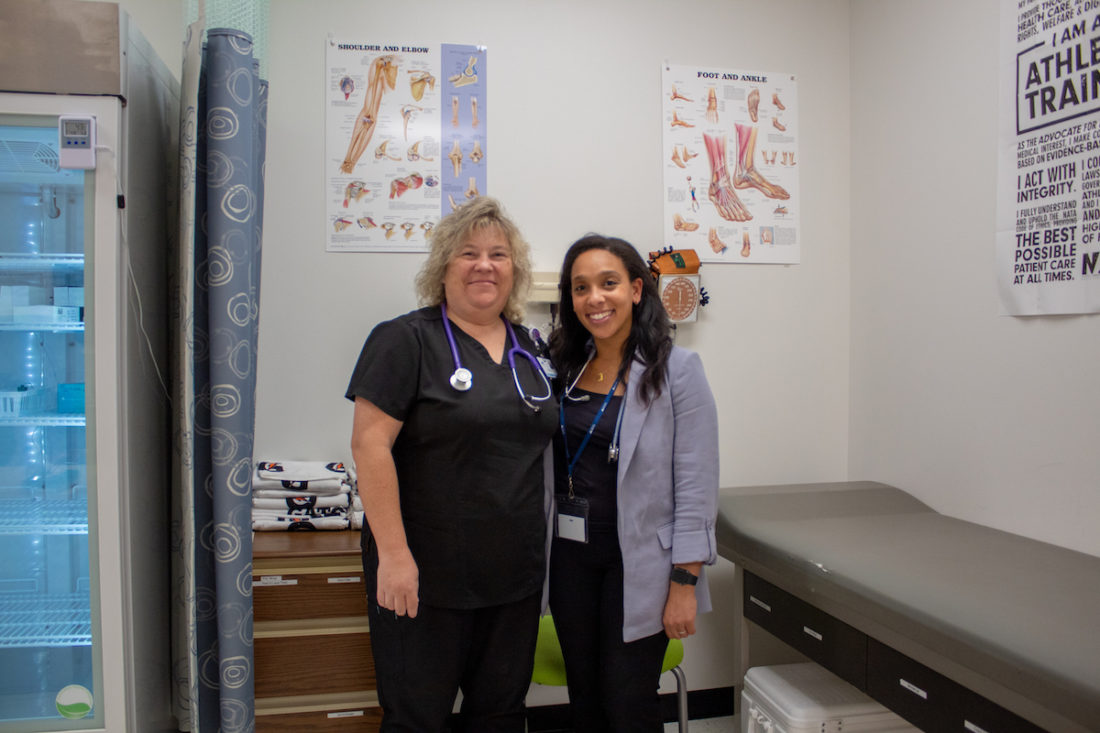A new health center opened May 2 to reach adolescents in need of health care right where they are: in school.
Asheville Middle School’s school-based health center, or SBHC, is a medical office located on campus and open during school hours. It is staffed by a physician assistant part-time and a full-time registered nurse; a part time behavioral health practitioner will join the team later.
The clinic at Asheville Middle School is the first such center in Asheville City Schools. Buncombe County Schools system is projected to open an SBHC center at Clyde A. Erwin Middle School for the fall 2022 school year.
An SBHC “operates like a physician’s office and provides treatment for illnesses and injuries, as well as behavioral health care,” says April Baur, school health program manager for Mountain Area Health Education Center.
Blue Ridge Health, a federally qualified health center, will provide services for both of the centers. Blue Ridge Health will manage the nurses in the centers.
Another layer of care
Students, faculty and staff are all welcome to use the SBHC at Asheville Middle School. The center served 71 students and eight faculty from May 2-15, Tammy Greenwell, chief operating officer of Blue Ridge Health, tells Xpress.
The clinic provides testing for viruses like influenza, strep, mononucleosis and COVID, and management of chronic health conditions like asthma and diabetes, says Greenwell. Patients can also be evaluated for minor injuries. All documents are provided in English and Spanish, and interpreters can be contacted for additional support.
The SBHC physician assistant and nurse will collaborate with Asheville Middle School’s nurse and the student’s primary care provider, says Greenwell. Typically, school nurses in the city and county schools divide their time between two locations, she explains. But SBHC medical staff will be in one school full-time.
The hope, Baur says, is for students “to receive a diagnosis and treatment in a timely manner” rather than need to make a primary care provider appointment outside school, or visit a walk-in clinic or emergency room. According to a fact sheet provided by Blue Ridge Health, the hope is to decrease health-related tardiness and absences as well as behavioral issues that lead to discipline problems.
Baur calls the school-based health clinic “a wonderful resource to add another layer of medical care for students and staff members.”
United in community
The two SBHCs are the result of a multiyear effort from several agencies: United Way of Asheville and Buncombe County, MAHEC, Buncombe County Health and Human Services, Buncombe County Schools and Asheville City Schools, says Deborah Calhoun, director of community partnerships for United Way of Asheville and Buncombe County. Dogwood Health Trust provided significant funding, among other partners.
United Way is the “backbone organization,” Calhoun says, on a project called the United for Youth Network. Its objective is for all students at city and county schools to graduate from high school college-ready by 2035. The organization partners with seven schools in Asheville and Buncombe County, which it calls community schools, to support the principal and staff. “Community schools are public schools that partner with families and community organizations to provide educational opportunities for student and family success,” Calhoun explains.
United Way’s community school coordinators, who work within each of the seven schools, liaise between the staff and the organization to identify needs. Shataura Dudley, the community school coordinator for Asheville Middle School, and Jocelin Rosas, who is in the same role at Erwin Middle School, said students, families and school staff could benefit from an additional layer of support with health care and behavioral health, explains Calhoun.
“We have school nurses in the schools that are doing their piece of it [and] we’ve got mental health and behavioral health providers providing services and support for students,” Calhoun explains. “But there wasn’t this coordinated clinic within the school to provide that added layer of support.”
Middle school needs
Asheville Middle School’s SBHC has an exam room, where the physician assistant is located, and a nurse is in a separate room across the hall.

A parent or guardian must provide written permission for a student to use school-based health services, Greenwell explains. The parent or guardian will be notified of a student’s visit to the SBHC “and what occurred during that time,” she says. The parent or guardian can also withdraw permission for the student to use the program.
Families are not required to use Blue Ridge Health as their primary care provider outside of the SBHC. “But if … they don’t have a primary care provider, we’re more than happy to take on that role for them,” Greenwell explains.
Blue Ridge Health is currently recruiting a part-time behavioral health counselor for the center at Asheville Middle School, says Greenwell. In the interim, the center provides telehealth mental health services for students with a school-based counselor employed by Blue Ridge Health at another community school. “We hope to get someone on-site before the next school year starts,” Greenwell says.
Blue Ridge Health is also receiving referrals for remote mental health services for Erwin Middle School students and contacting parents about initiating that care, Greenwell says. Mental health services can be one-time check-ins or regularly scheduled counseling sessions.
“If there’s a crisis happening at the school, we want to be the medical first responder and and the behavioral health response as well so that we can help support the school in that crisis situation,” Greenwell explains
Ashley Thublin, spokesperson for Asheville City Schools, and Asheville Middle School Principal April Collins did not respond to requests for comment.
Why school-based health centers?
Blue Ridge Health will continue to operate the SBHC at Asheville Middle School over summer break in a reduced capacity, says Greenwell. Students from Erwin Middle School who have begun telehealth behavioral health counseling by summer break can continue receiving those services, too.
Though the centers are in the early stages in Asheville, the long-term goal is for these health centers to not only treat students but also their siblings and their families. “Ultimately, the vision is to be a districtwide hub of health care and behavioral health services not only within the four walls of the school, but for folks who are connected to the school,” Calhoun says.
Other SBHCs operated by Blue Ridge Health across WNC also offer vision screening, dental and nutrition services. The nonprofit opened its first SBHC in Henderson County in 1993 and now operates nearly three dozen SBHCs, according to its website.
Each center can provide different services based on the school’s needs; some provide only medical services, while others provide behavioral health services as well.
As part of their behavioral health services, the centers can also provide support groups — such as Al-Anon/Alateen, a support group for children of alcoholics, or an eating disorder recovery support group. Greenwell says United Way’s community school coordinators can assist with identifying needs for such groups in schools, and Blue Ridge Health will work with the school and other behavioral health agencies to meet that need.
The hope is that the SBHCs “provide support so that children can stay in school and learn and thrive and grow,” says Calhoun.






This is great news for AMS students! Hopefully part-time staff will be enough to meet student need.
We obviously need a new definition for the word, school. I propose: School, a governmental hub of social services run by social workers with teaching responsibilities.